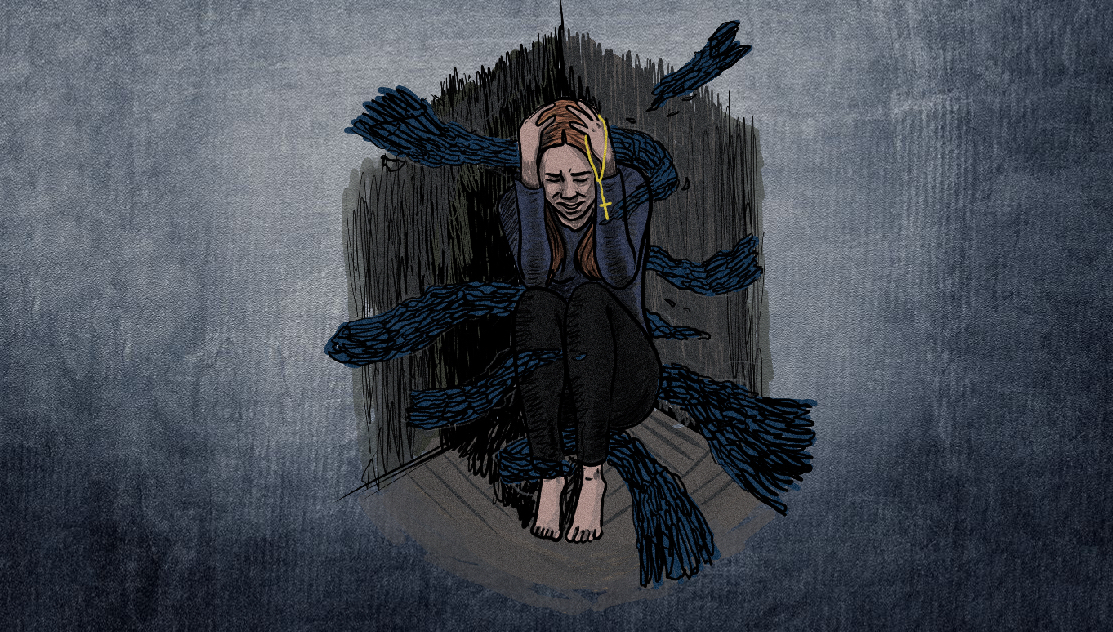THE COUNTRY’S top exorcist has linked depression to demonic influence, stressing the sacrament of confession as a preventive measure.
While not in principle disregarding the science of depression, exorcist Fr. Jose Francisco Syquia, director of the Archdiocese of Manila’s Office of Exorcism, said it should be seen as a spiritual problem since the devil targets man’s emotions to control him.
“It is very important not only to see depression simply as a psychological problem. Now we know that psychology has advanced in decades, but why are there more suicides now, four times more than the past? [That’s] because it’s not simply a psychological problem. It is a spiritual problem,” he told the Varsitarian.
Syquia claimed that the increased depression and suicide rates in the country are the normal work of the devil who is “a murderer from the beginning.” God will not let someone experience a mental disorder that will lead to death, he said.
College of Education Regent Fr. Winston Cabading, O.P., who is also an exorcist, pointed to a connection between the decline of faith and increase in suicide rates.
“I would say that the loss of the sense of a reality higher than our physical world leaves many with a disposition to regard as absolute value only the here and now. To prolong happiness through the enjoyment of life and to end it if it is no longer worth living,” said Cabading in an email interview.
He added that exposure to occult or the world of spirits enable evil entities to attach to a person’s emotions, making it the most common cause of “diabolic” depression.
The two exorcists defined diabolic depression as “a combination of clinical, worldly, spiritual and demonic depression that hampers spiritual growth and may lead to spiritual death or the loss of love for God.”
One’s refusal of spiritual help from the Church is a symptom of this type of depression.
Compared with diabolic depression, Lucila Bance, director of UST Counseling and Career Center, explained that clinical depression may be caused by chemical imbalances in the brain or an experience of loss or a misfortunate event.
Bance warned that suicidal behavior can be contagious. The proliferation of suicide stories in mainstream media has been attributed to the increase of suicide cases.
Depression may also be associated with the use of social media, where people tend to regard others as better than themselves, she added.
According to the World Health Organization, depression is the leading cause of mental illness and disability with more than 300 million people diagnosed worldwide.
In the Philippines, the Department of Health reported that at least 3.3 percent of the country’s population suffer from depressive disorders and another three percent experience anxiety.
‘Spiritual cases require spiritual remedies’
Cabading said sacramental confession is the first step in treating diabolic depression because “the restoration of the sanctifying grace ensures that the demon has no access to the soul.”
“This grace must then be nurtured by receiving and asking from God actual graces, followed by living and striving in holiness and virtue, through persevering prayer, frequenting of the sacraments of the Holy Eucharist, regular confession, spiritual direction, spiritual reading, and a strong support system from family and friends, among others,” he added.
Apart from medical help, Syquia said the faithful must also be oriented with weapons of the Church against the devil such as sacramentals and deliverance prayers.
“Science and faith should work together to help the human person, because the person is both body and soul,” he said.
Cabading also stressed the importance of Catholic psychiatrists and psychologists to determine whether the patient displays demonic influence.
“The help of a professional Catholic psychiatrist who believes in the possibility of the demonic is invaluable as they can judge after a series of tests whether something is clinical or beyond clinical,” he said.
Echoing Cabading, Bance said Christian psychologists may cite God’s messages of hope and faith to mitigate depression.
“Faith can mitigate symptoms of depression. Faith provides hope, assigns meaning to suffering, and provides a support system and inspiration, which can all be helpful to anyone suffering from feelings of depression or suicidal tendencies,” she told the Varsitarian in an email interview.
Medical studies have found spiritual people less prone to self-destructive behaviors and stress while possessing a greater total life satisfaction, Bance added.
In his book “People of the Lie”, Morgan Scott Peck, an American psychiatrist, likened evil to an illness which must be diagnosed and cured medically and spiritually.
Peck, who is also the author of the book “The Road Less Traveled,” claimed that psychotherapy is also a form of exorcism in which the patient is relieved of evil thoughts and emotions.
Cabading maintained that demons can only be cast out through the grace of Jesus Christ but recognized that this grace may extend even to non-believers.
“I am certain God has a way of helping those among their people who may be under the sway of the evil one… When there is a spiritual dimension to the problem, the Church is competent to help,” he said. Dominic Eugene V. Aboy, O.P., with reports from Lexanne O. Garcia














